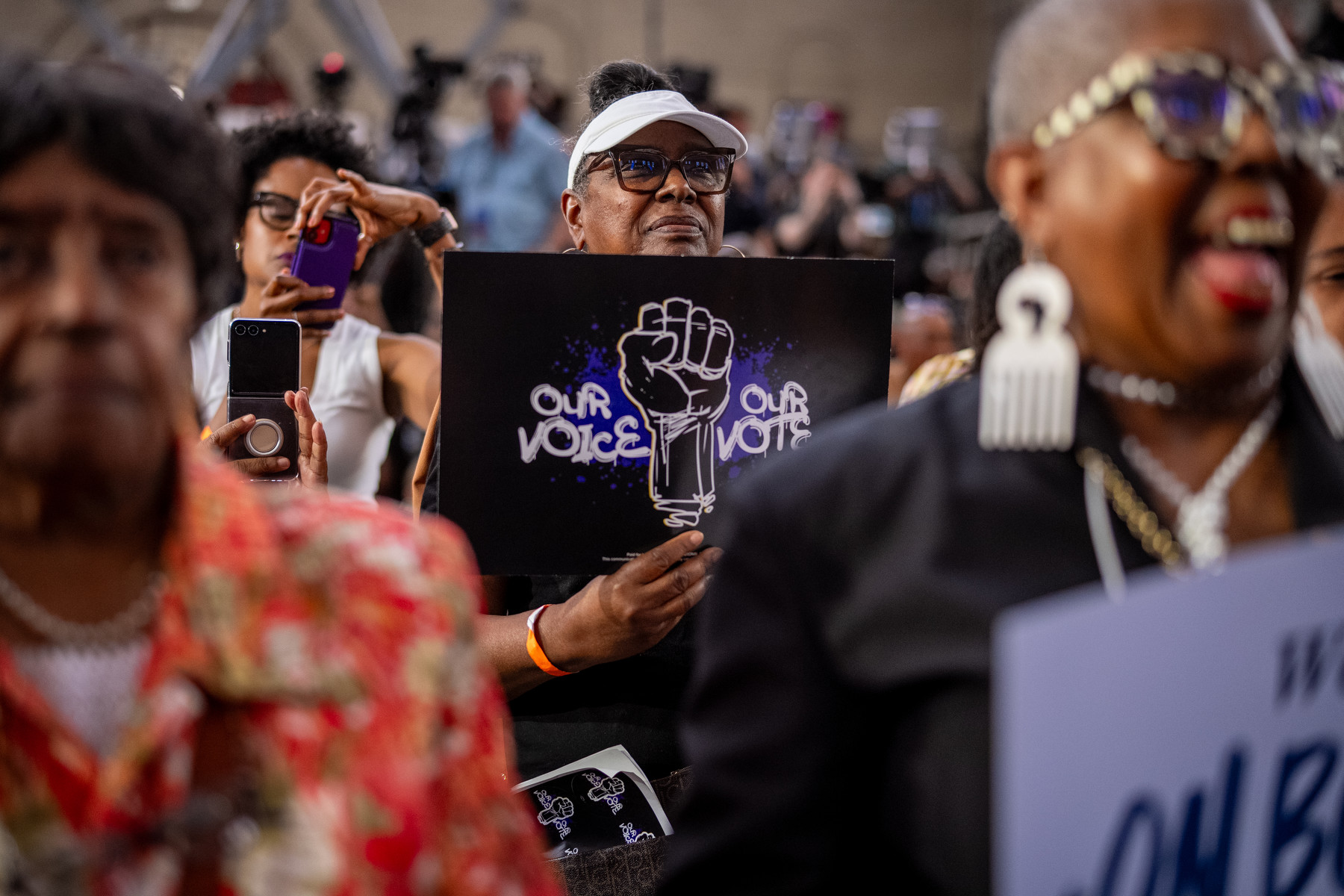Your trusted source for contextualizing abortion and Election 2024 news. Sign up for our daily newsletter.
A greater share of women voters say they trust Vice President Kamala Harris more than former President Donald Trump to address the rising cost of household expenses, a shift from June, when women voters were evenly split between the parties on this question. The shift is driven largely by Black women and Latinas, for whom inflation remains a top priority, and who trust Harris more on this issue than they did Democrats when President Joe Biden was at the top of the ticket.
That’s according to a new survey from KFF, a nonprofit health policy research, polling and news organization, which refreshed its nationwide survey of women voters to see how, among other developments, Biden’s departure from the race and Harris’ nomination had impacted these voters’ outlook. The June survey asked voters about Republicans and Democrats generically; neither party had formally nominated their candidates for the White House.
The economy remains the top issue for women voters, with 31 percent ranking inflation as the most important issue motivating their vote. Threats to democracy (24 percent), abortion (13 percent), and immigration and border security (13 percent) are the other top concerns.
Inflation remains the number one issue for women voters overall, especially for Black women and Latinas. About half of Black women say this is their top election issue, compared with 41 percent of Latinas and 36 percent of women voters overall. The economy is one of the strongest talking points for Trump, the Republican presidential nominee; in the KFF survey fielded in May and June, 44 percent of Latina voters said their finances were better during his administration. Only 22 percent of Black women voters said the same.
Before the summer of political chaos, which also included a first assassination attempt against Trump, women voters were split on which party did a better job on addressing household costs: 29 percent said Democrats, 31 percent said Republicans, and 40 percent said neither.
Now, with Harris at the top of the ticket, she has a clear edge: 46 percent trust her to address the cost of household items, versus the 39 percent who trust Trump more. Again, Black and Latina voters say they trust Harris more here, as they trusted Democrats more earlier this year. But the share has significantly increased, with 53 percent of Latina voters saying they trust Harris the most, compared with 35 percent earlier this year. Seventy percent of Black women voters trust Harris, up from 51 percent in June.
The survey found significant changes in women voters’ overall mood about the election following Harris’ nomination.
A greater share of women voters say they feel more hopeful. Just about half of women in June used this word to describe their mood about the election; in September, around two-thirds of women voters reported feeling this way.
About two-thirds of women voters also said they were satisfied with the candidate options before them, a shift driven by Democratic women. Just 36 percent of Democratic women said they were satisfied back in June, compared with a whopping 75 percent who reported feeling so in September. Satisfaction with the candidate slate jumped most among Black women; 71 percent reported feeling very or somewhat satisfied, a 30-point jump from June.
The poll found more motivation to vote among women voters, recording a 19-point increase in the share of women who say they are more motivated to vote this November compared with past presidential elections — a jump from 45 percent in June to 64 percent in September.
The survey also found some significant shifts in women voters’ outlook on the issue of abortion.
Four in 10 women voters under 30 now say abortion is the most important issue to their vote, double the share who said so back in June, surpassing inflation as the top election issue for this age group. Annual inflation estimates which had soared following the pandemic have been cooling for months, reaching a three-year low in September, according to the Labor Department.
Women voters overall are slightly more likely to say the election will have a major impact on abortion access. This shift is driven by Democratic women; a majority of Republican women don’t see the election as having a significant impact on the issue.
KFF surveyed 678 registered women voters from September 11 through October 1, a share of the 1,383 who had participated in their June survey. The margin of error is 5 percentage points.
To check your voter registration status or to get more information about registering to vote, text 19thnews to 26797.




